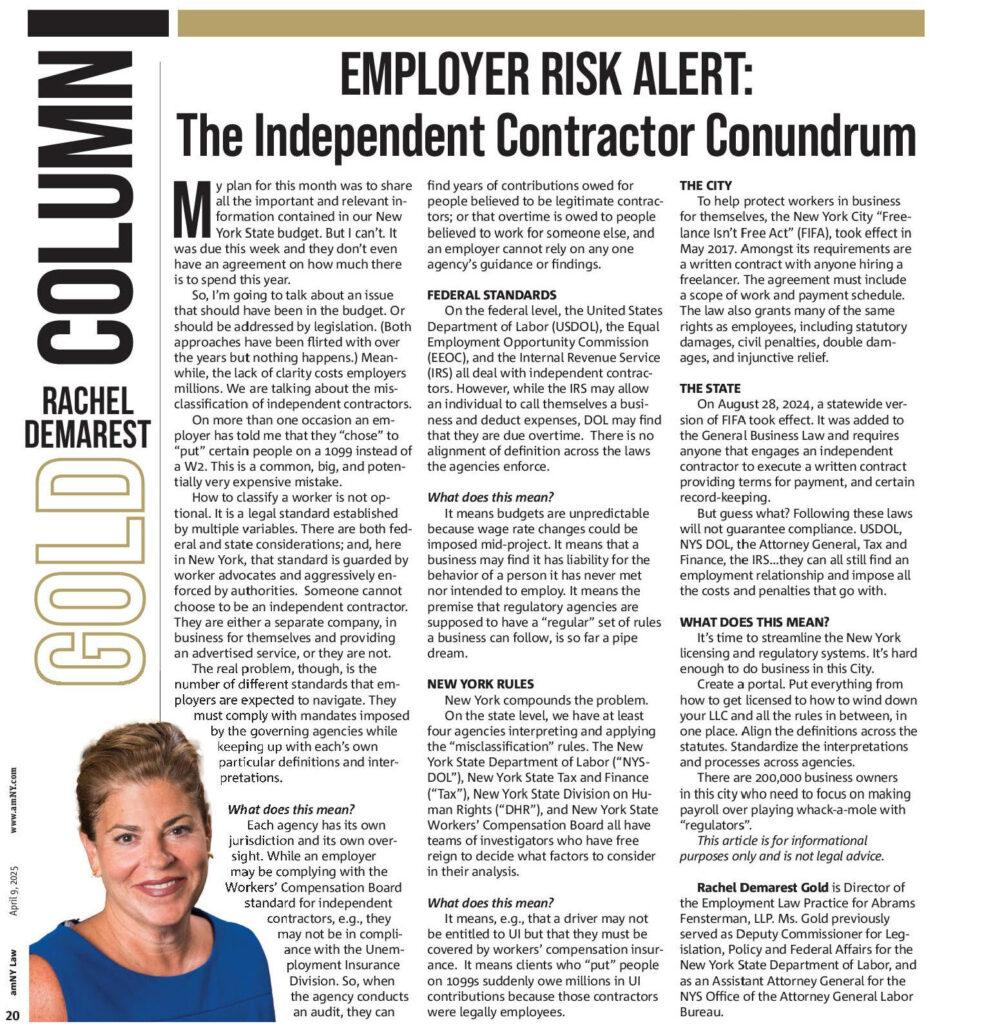NEW STATE LAW IMPOSES ADDITIONAL OBLIGATIONS ON EMPLOYERS
On December 13, 2010, Governor Patterson signed the Wage Theft Prevention Act (the “WTPA”), which imposes additional obligations upon employers and creates additional penalties for noncompliance. The WTPA becomes effective on April 12, 2011. Among other provisions, the WTPA contains provisions relating to wage forms, the period of time during which records must be kept, enforcement proceedings, and penalties.
- Written Acknowledgment of Wage Rate By Employees: In 2009, New York imposed a new requirement that employers obtain a written acknowledgment of their wage rate from all new employees. The WTPA further enhances this law by requiring that the notices be in English and in the employee’s primary language and that the notice be signed each year by February 1st. The following information must be included in the notice: (1) the rate or rates of pay and whether the employee is paid by the hour, shift, day, week, salary, piece, commission or other basis; (2) allowances, if any, claimed as part of the minimum wage, including tip, meal or lodging allowances; (3) the name of the employer; (4) any “doing business as” names; (5) the physical and mailing addresses of the employer; and (6) the employer’s telephone numbers.
- Extended Period of Time to Maintain Records: The period of time during which employers are required to keep contemporaneous payroll records has been expanded to six years.
- Confidentiality of Complainants’ Names: The WTPA requires that the names of employees subject to an investigation must be kept confidential until disclosure is necessary to resolve the investigation or complaint.
- Enforcing an Order to Comply: Significantly enhancing the DOL’s ability to enforce its orders, the WTPA provides that if an Order to Comply issued by the DOL Commissioner remains unsatisfied for 10 days after the period to appeal has expired (and no appeal is pending), the Commissioner can require the employer to reveal its assets, including bank accounts, accounts receivable and, personal and real property, and can bring a lawsuit to enforce the order.
- Minimum Wage Payments: Prior to the WTPA, the Commissioner could collect the full amount of any underpayment on behalf of an employee who was not paid minimum wage. The WTPA now requires that the full amount of underpayment be collected.
- Penalties:
- Failure to Provide Acknowledgment of Wages: The WTPA provides that an employee can sue his employer for a failure to provide an acknowledgment of wages within 10 days of the start of employment. The penalty is $50 for each work week for which there is no acknowledgment, up to a maximum of $2,500, along with attorneys’ fees and costs.
- Failure to Provide Wage Statements: The WTPA imposes penalties of $100 per week (up to a maximum of $2,500), along with costs and attorneys’ fees, on those employers who have not provided their employees with a wage statement.
- Liquidated Damages: Along with recovering wages, benefits and wage supplements, employees may also recover liquidated damages of up to $10,000 from employers who fail to abide by the WTPA.
For more information on this or other employment-related issues, please contact Sharon Stiller, Esq. or your attorney contact at our firm. Thanks.





